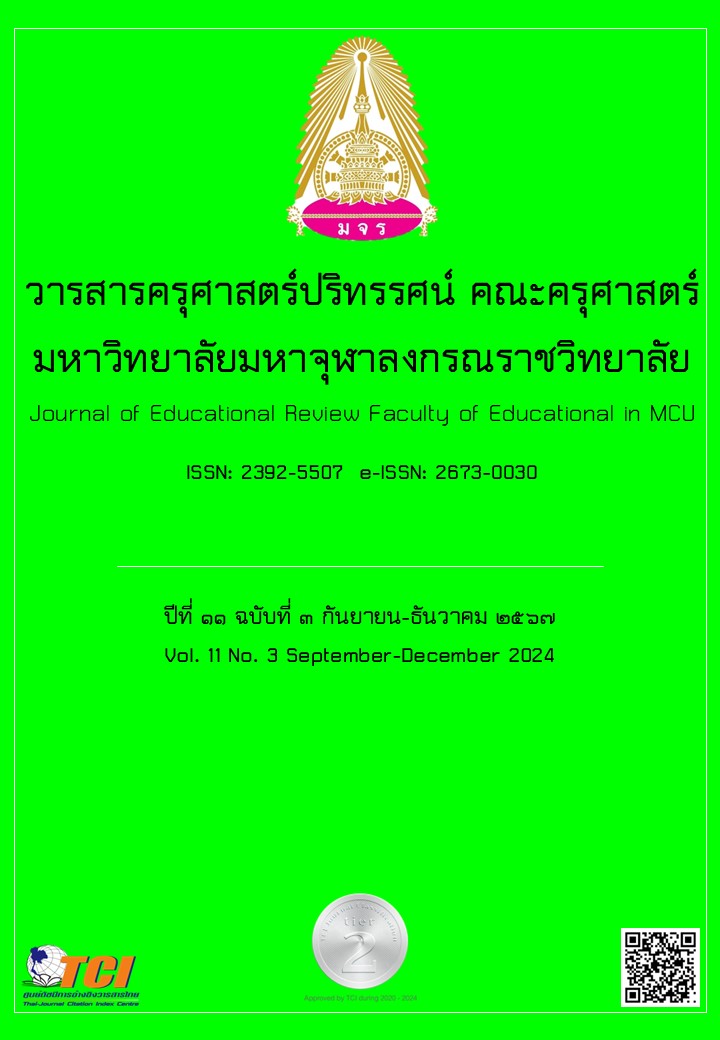GUIDELINES FOR DEVELOPING THE EMOTIONAL INTELLIGENCE OF EDUCATIONAL INSTITUTION ADMINISTRATORS PRIMARY SCHOOL UNDER THE JURISDICTION OF THE PHICHIT PRIMARY EDUCATIONAL SERVICE AREA OFFICE, AREA 2, ACCORDING TO THE PRINCIPLES OF PHAWANA 4
Main Article Content
Abstract
This research aims to 1) study the emotional intelligence of school administrators and 2) find a way to develop emotional intelligence of school administrators according to the Four meditation principles (Bhvana). This research is a mixed-method research. The quantitative research used a questionnaire with a sample of 302 teachers. Data were analyzed using statistics, including frequency, percentage, mean, and standard deviation. Qualitative research was conducted by interviewing 9 key informants. Data were analyzed using content analysis. The research results found that 1) Overall, the emotional intelligence of school administrators in schools under the Office of the Primary Educational Service Area 2, Phichit, was at a moderate level. When considering each aspect, all 5 aspects were at a moderate level: self-control of emotions, social skills, self-motivation, self-awareness of emotions, and understanding others’ emotions, respectively. 2) The development guidelines for emotional intelligence of school administrators according to the Four meditation principles (Bhvana) consisted of (1) self-awareness of emotions, understanding and listening to others’ feelings, controlling emotions and problem-solving mindfully, and giving feedback and praising teachers for expressing their opinions. (2) Self-control of emotions: Creating an understanding of both positive and negative changes, created an open and supportive atmosphere for teachers to seek knowledge and adapt to the situation. (3) Self-motivation: Developing yourself in both theory and practice, supporting communication skills in working with others, practicing new skills to learn. (4) Understanding others' emotions: Building an understanding of others' perspectives, reducing conflicts and finding solutions together, learning how to manage others' emotions, building good relationships and working smoothly with others. (5) Social skills: Building communication and interaction with others appropriately, providing opportunities to invite open and friendly conversations.
Article Details

This work is licensed under a Creative Commons Attribution-NonCommercial-NoDerivatives 4.0 International License.
ทัศนะและความคิดเห็นที่ปรากฏในบทความในวารสารฉบับนี้ถือเป็นความรับผิดชอบของผู้เขียนบทความนั้นเพียงผู้เดียว และไม่ถือเป็นทัศนะและความรับผิดชอบของกองบรรณาธิการ
กองบรรณาธิการขอสงวนสิทธิ์ในการคัดเลือกบทความลงตีพิมพ์และจะแจ้งให้เจ้าของบทความทราบหลังจากผู้ประเมินบทความตรวจอ่านบทความแล้ว
ต้นฉบับที่ได้รับการตีพิมพ์ในวารสารครุศาสตร์ปริทรรศน์ คณะครุศาสตร์ มหาวิทยาลัยมหาจุฬาลงกรณราชวิทยาลัย ถือเป็นกรรมสิทธิ์ของคณะครุศาสตร์ มหาวิทยาลัยมหาจุฬาลงกรณราชวิทยาลัย ห้ามนำข้อความทั้งหมดหรือบางส่วนไปพิมพ์ซ้ำ เว้นเสียแต่ว่าจะได้รับอนุญาตจากมหาวิทยาลัยฯ เป็นลายลักษณ์อักษร
References
ทอดศักดิ์ เดชคง. (2545). ความฉลาดทางอารมณ์จากทฤษฎีสู่การปฏิบัติ. กรุงเทพมหานคร: มติชน.
จิตติมา สุนทรรส. (2564). รูปแบบการใช้หลักภาวนา 4 เพื่อการจัดการเรียนรู้ในโรงเรียนคุณธรรมของผู้บริหารสถานศึกษา สังกัดสำนักงานเขตพื้นที่การศึกษาประถมศึกษามหาสารคาม เขต 1. Journal of Roi Kaensarn Academi. 6(10). 2-3.
จิล แดนน์. (2549). EQ ดีใน 7 วัน. แปลโดย ธนะ เอี่ยมอนันต์. กรุงเทพมหานคร: บิสคิต.
ชาปิยา สิมลา. (2563). ความฉลาดทางอารมณ์ของผู้บริหารกับคุณภาพชีวิตในการทำงานของครู สังกัดสำนักงานเขตพื้นที่การศึกษาประถมศึกษาสมุทรสาคร. วิทยานิพนธ์ศึกษาศาสตรมหาบัณฑิต.มหาวิทยาลัยศิลปากร.
พระมหาคณิตศาสตร์ คเวสโก (มั่นในบุญธรรม). (2560). กระบวนการพัฒนาความฉลาดทางอารมณ์สำหรับนักศึกษาอาชีวศึกษาด้วยการปฏิบัติตามแนวสติปัฎฐาน 4. ดุษฎีนิพนธ์พุทธศาสตรดุษฎีบัณฑิต. มหาวิทยาลัยมหาจุฬาลงกรณราชวิทยาลัย.
รัตติยา จันทร์สว่าง. (2566). การบริหารงานวิชาการในยุคดิจิทัลตามหลักภาวนา 4 ของผู้บริหารสถานศึกษา สังกัดสำนักงานเขตพื้นที่การศึกษาประถมศึกษาอุดรธานี เขต 4. วารสารการบริหารการศึกษา มมร.วิทยาเขตร้อยเอ็ด. 3(2). 105-116.
อุไรวรรณ ชูมี. (2561). การศึกษาความฉลาดทางอารมณ์ของผู้บริหารสถานศึกษาตามการรับรู้ ของครูผู้สอน สังกัดสำนักงานเขตพื้นที่การศึกษา ประถมศึกษาสุราษฎร์ธานี เขต 1. วิทยานิพนธ์ครุศาสตรมหาบัณฑิต. มหาวิทยาลัยราชภัฎสุราษฎร์ธานี.
Daniel Goleman. (1998). Working with Emotional Intelligence. New York: Bantam Books.
Krejcie, R.V. & D.W. Morgan. (1970). Determining Sample Size for Research Activities. Educational and Psychological Measurement. 30(3). 607-610.


